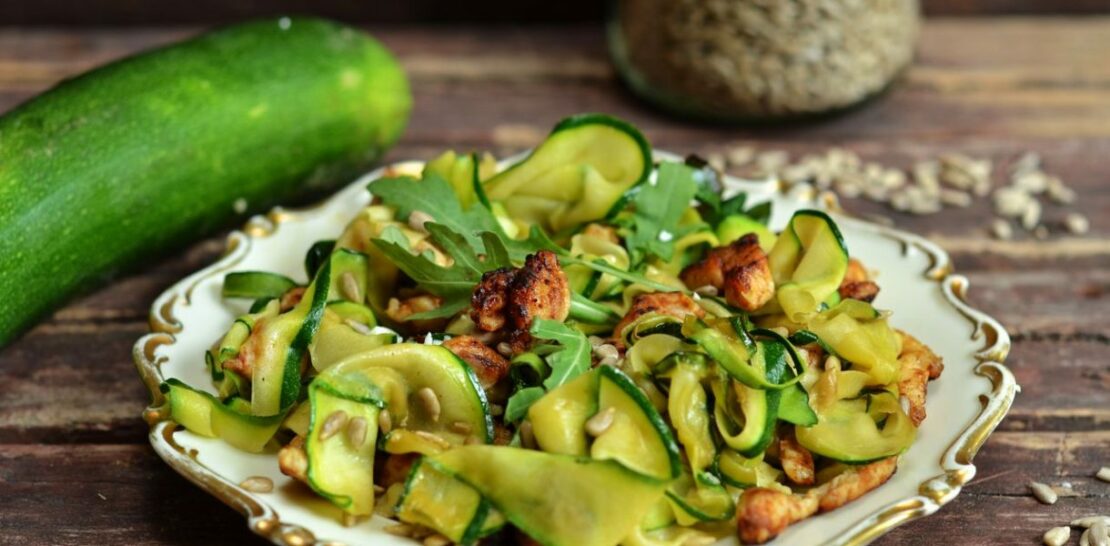In this article, we dive deep into the world of zucchini, exploring the question that has puzzled culinary enthusiasts and health-conscious individuals alike: Can zucchini be eaten raw?
Zucchini, also known as courgette, is a versatile summer squash that has become a staple in many diets due to its nutritional value and adaptability in various dishes.
The idea of consuming raw zucchini may come as a surprise to some, but as you’ll see, there are numerous reasons why it can be a delicious and nutritious addition to your diet.
We’ll examine the nutritional profile of raw zucchini, discuss the potential health benefits, and provide tips on how to incorporate it into your meals, as well as dispel any potential misconceptions or concerns regarding its consumption.
Raw Zucchini: Nutritional Powerhouse or Just Another Vegetable?
Before we can address the question of whether zucchini can be eaten raw, it is essential to understand its nutritional composition and how it compares to other vegetables.
Raw zucchini is an excellent source of essential vitamins and minerals, with a 100-gram serving providing the following nutrients:
- Vitamin C: 17.9 milligrams (30% of the Recommended Daily Allowance)
- Potassium: 261 milligrams (7% of the RDA)
- Fiber: 1 gram (4% of the RDA)
- Protein: 1.2 grams (2% of the RDA)
- Folate: 24 micrograms (6% of the RDA)
- Vitamin A: 200 International Units (4% of the RDA)
- Calcium: 16 milligrams (2% of the RDA)
In addition to these nutrients, raw zucchini is low in calories, with only 17 calories per 100-gram serving, making it an attractive option for those seeking to maintain a healthy weight. Compared to other vegetables, such as raw carrots (41 calories per 100 grams) and raw bell peppers (20 calories per 100 grams), zucchini offers a more calorie-efficient way to obtain essential nutrients.
Health Benefits of Consuming Raw Zucchini
As a nutrient-dense food, raw zucchini offers numerous health benefits. Here are four key advantages to incorporating raw zucchini into your diet:
- Antioxidant Properties: Zucchini is rich in antioxidants, such as vitamin C and carotenoids like lutein and zeaxanthin, which help combat oxidative stress and reduce inflammation. Consuming a diet high in antioxidants has been linked to a reduced risk of chronic diseases, including heart disease and certain types of cancer.
- Weight Management: As a low-calorie, high-fiber food, raw zucchini can help you feel fuller for longer, which may aid in weight management. Additionally, zucchini’s high water content (95%) can contribute to proper hydration and support overall health.
- Improved Digestion: The fiber in raw zucchini can promote healthy digestion by adding bulk to stools and preventing constipation. Consuming adequate amounts of fiber is also associated with a lower risk of developing digestive disorders, such as irritable bowel syndrome and diverticulitis.
- Blood Sugar Regulation: The fiber in zucchini can help to slow down the absorption of sugar into the bloodstream, which may contribute to better blood sugar control. Research suggests that a diet rich in high-fiber vegetables, such as zucchini, can help reduce the risk of developing type 2 diabetes and improve diabetes management in those already diagnosed.
Dispelling the Myths: Addressing Concerns About Raw Zucchini Consumption
Despite the numerous benefits associated with consuming raw zucchini, some concerns and misconceptions still exist. In this section, we will address two common concerns:
1. Cucurbitacin Toxicity: As a member of the Cucurbitaceae family, zucchini contains a group of compounds called cucurbitacins, which can be toxic in large quantities. However, the levels of these compounds in commercially grown zucchini are generally too low to cause any harm. Most cases of cucurbitacin poisoning have stemmed from consuming bitter-tasting homegrown zucchini. To avoid potentialissues, always taste a small piece of raw zucchini before consuming it. If it tastes excessively bitter, discard the zucchini and do not consume it.
2. Nutrient Loss: Some individuals may be concerned that consuming raw zucchini could lead to a loss of nutrients, as cooking is known to break down certain compounds and make them more bioavailable. While it is true that some nutrients, such as vitamin C, may be slightly reduced in cooked zucchini compared to its raw counterpart, the overall nutrient profile remains relatively intact. Furthermore, cooking can also increase the bioavailability of certain nutrients, such as carotenoids. This means that whether you choose to consume zucchini raw or cooked, you can still reap its nutritional benefits. Ultimately, it comes down to personal preference and the specific dishes you wish to prepare.
Delicious Ways to Incorporate Raw Zucchini into Your Diet
Now that we have established the nutritional benefits of raw zucchini and addressed potential concerns, it’s time to explore some creative ways to incorporate this versatile vegetable into your meals. Here are five ideas to get you started:
1. Zucchini Noodles: Also known as “zoodles,” zucchini noodles are a popular alternative to traditional pasta, offering a low-carb, gluten-free option. Simply use a spiralizer or vegetable peeler to create thin, noodle-like strands of raw zucchini, and then toss them with your favorite sauce or dressing.
2. Zucchini Carpaccio: Inspired by the classic Italian dish, zucchini carpaccio is a simple yet elegant appetizer or side dish. Thinly slice raw zucchini using a mandoline or sharp knife, then arrange the slices on a plate. Drizzle with olive oil, lemon juice, and season with salt and pepper. Finish with a sprinkling of freshly grated Parmesan cheese and a handful of chopped fresh herbs, such as basil or mint.
3. Zucchini Ribbon Salad: For a refreshing and vibrant salad, use a vegetable peeler to create long, thin ribbons of raw zucchini. Combine the zucchini ribbons with other thinly sliced vegetables, such as radishes and carrots, and toss with a tangy vinaigrette. Add crumbled feta cheese, toasted nuts, or olives for extra flavor and texture.
4. Zucchini Sushi: Raw zucchini can make a unique and healthy alternative to traditional sushi rolls. Use a vegetable peeler to create thin, wide strips of raw zucchini. Spread a thin layer of hummus or another spread onto the zucchini strip, then layer with your choice of vegetables, such as avocado, cucumber, or bell pepper. Roll the zucchini tightly around the filling and slice into bite-sized pieces.
5. Zucchini Smoothie: For a nutrient-packed drink, blend raw zucchini with your favorite fruits, such as berries, kiwi, or pineapple, along with a liquid base like water, coconut water, or almond milk. Add a scoop of protein powder or a spoonful of nut butter for an extra boost of protein and healthy fats.
In conclusion, not only can zucchini be eaten raw, but it also offers a wealth of nutritional benefits and culinary possibilities. From antioxidant properties to weight management and improved digestion, raw zucchini is a versatile and nutrient-dense addition to a balanced diet. By incorporating this summer squash into your meals in innovative and delicious ways, you can enjoy the raw potential of zucchini and support your overall health and well-being.




